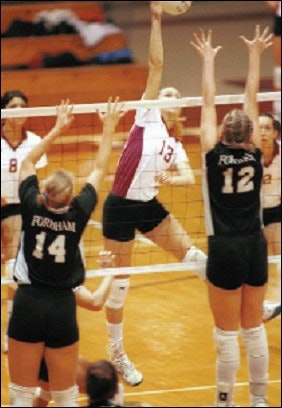Athletic administrators live with decisions to eliminate sports long after the fact

The elimination of a sport within a collegiate athletic program has been likened by some to a death in the family. Affected student-athletes may even experience ranges of emotion common to the grieving process - shock, anger and ultimately, one hopes, understanding. At the receiving end of those emotions are the individuals whose fingerprints are all over the pulled plug.
Within a 16-day period last March, sports were cut by the University of Massachusetts at Amherst and Portland State, Bowling Green State and Tulane universities. A year removed from those announcements, athletic administrators on each campus remember vividly the difficulty in reaching their decisions, which would carry lasting and far reaching effects.
"Other than a couple of instances in which I've had to deal with parents after one of our students passed on, this was the hardest thing I've ever had to do in college sports," says Bill Strickland, associate athletic director at the University of Massachusetts at Amherst, which cut seven sports amid flagging basketball fortunes and sagging state budget support. "It's a difficult and emotional time for people, and no matter what you say, you can never make it right for the kids."
"In my fourth month at the University of Tulsa, my alma mater, I had to stand in front of a group and tell them that because of things that had happened prior to them or me being there, our program was put on probation for a year and they were not going to be able to compete in postseason play. I thought that was extremely unfair, unwarranted and difficult, but I would say this superseded it," says Rick Dickson, Tulane's athletic director, on having to defend his decision to discontinue men's indoor and outdoor track to help that school overcome a 40 percent gender participation disparity and solidify NCAA certification.
"The worst thing an athletic director can do is tell some kids that they have to pursue their dream elsewhere if they want to continue to play," says Portland State athletic director Tom Burman, who cut men's golf to chip away at a $225,000 reduction in institutional support for his department. "Their dreams are crushed."
For athletic administrators, picking up the pieces can take time. The first year following such a decision may be the toughest, bringing the most backlash and the least savings. Bowling Green announced that cutting men's tennis, swimming, and indoor and outdoor track and field would save $360,000 annually, but the school realized only a fraction of that during the next 12 months, according to athletic director Paul Krebs. Though the seven dropped UMass sports teams carried annual budgets totaling $1.1 million, net savings to the athletic department are closer to $500,000. "We're not really seeing a direct financial benefit at this point, because we have to pay off severances for certain coaches and we have athletes who are still on scholarship," says Strickland. (It's standard practice to offer another full year of aid to scholarship athletes who wish to continue their academic careers at their chosen school. Those who seek to transfer in the interest of competing further are typically assisted in their search by athletic department personnel.)
The amount of budget money consumed by a given sport is just one of several criteria often cited when choosing which sports are logical candidates for elimination. A program's history of success and fan support are weighed, as are the core sport requirements of a school's membership in its conference and the regional and national health of the sport in question. In most cases, Title IX implications are at least considered, and impact on coaches and facilities are factored, as well. At Portland State, which lacks a campus golf course, Burman was able to retain his golf coach, who had been leading both the men's and women's teams, at full salary while eliminating only one part-time assistant position. At Tulane, the previously announced retirement of the school's longtime track coach presented a convenient break from the past, Dickson says.
But even the strongest case for cutting a sport doesn't guarantee that breaking the news will be easy. When time came to inform four returning scholarship athletes that men's track would be eliminated at Tulane, Dickson gathered the teams' graduating members, athletes from the women's track programs, a faculty representative, the associate athletic director supervising track and the department's senior women's administrator. "It certainly would have been much easier for the three or four adults - the administrators and faculty members in this case - to deal with four young men, whether it's one on one or in a group," Dickson says. "But I think it was important for them not to feel singled out, isolated and preyed upon."
For more than two hours, Dickson and his colleagues laid out the logic behind the decision, emphasizing the fact that cross country would remain a varsity sport, providing the four athletes with a competitive outlet. Dickson expected emotions to eventually come to a head, and they did, even becoming personal at times. "I told our staff, 'When it gets to that point, you need to step back. I'll be the lightning rod,' " he recalls. "That was the hardest single exercise I've gone through in 15 years as an AD - to let kids vent for an hour and just take it. But having to endure that was necessary."
Bob Marcum, the UMass AD at the time of that school's cuts (he has since come out of retirement to serve as AD at Marshall, his alma mater), took plenty of flak after placing the onus of informing affected student-athletes on their respective coaches. "There's no right way to do it," says Strickland. "If you don't give them lead time, they're upset that you did not communicate with them properly. If you do give them lead time, it gets leaked to the media and played out in the press, causing you even more problems. You can't win."
Once the word is out, the shock waves often reach beyond campus boundaries to alumni of the affected sports programs. For several months following Bowling Green's announcement, the athletic department received dozens of critical phone calls, e-mail messages and letters. A list of frequently asked questions and corresponding answers regarding the cuts was added to the BGSU web site and remained there for most of last year. "You're severing a bond," Krebs says, "a connection to a history. The passion and the love that the athletes had for their particular sport and their university in many cases gets severed, and that's something that may never be repaired."
Krebs admits that he's forced to deal with the aftermath of the decision in his day-to-day life. "We still have athletes on campus whose sport has been eliminated, so there are some reminders," he says. "While we have moved forward, there's a part of that that's always going to be there."
Like Krebs, Dickson has done his best to focus on the future. He says a personal turning point came with the hiring in July of Heather Van Norman as coach of both the Tulane women's track and field and men's cross country programs. "I just felt extremely invigorated by her and her staff," Dickson says. "We had her meet with the student-athletes who were here during the summer, and that's probably the first frequent interaction I started having with those student-athletes again. During the hiring process they said, 'Gosh, we love this person,' and 'This is exactly what we need.' Then all of a sudden the focus became normal student-athlete and program issues, and I think it was at that point that I felt like, 'OK, the tough part is behind us. Let's focus on bringing this back together.' "
Without exception, these four administrators would prefer to keep discussion of cutting sports in the past tense. "To this day, as I think about what happened, it's a situation that I hope I never find myself in again," says Krebs. "As an athletic director, I believe that every sport teaches you certain life lessons, and that rowing or tennis or golf is as valuable as basketball or football."
"No athletic director gets into this business with an eye toward cutting opportunities for young people," says Strickland, adding that the UMass cuts left 136 athletes without teams. "We're here to create opportunities."
Earlier this year, UMass gymnasts abandoned fund-raising efforts they hoped would spare their teams, a goal requiring a multimillion-dollar endowment per the chancellor's request. But will the nation's current economic downturn or the uncertain status of Title IX in the wake of the Commission on Opportunity in Athletics' review of the 30 year-old legislation result in more difficult decisions down the road for these and other schools?
"I don't think we're going to be looking at cutting any sports anytime soon," Strickland says. "On the other hand, we are not on good financial footing right now, because the same set of circumstances still exist. The Commonwealth is still having severe budget problems, so therefore the university is having budget problems." Says Burman: "If you look around us, people are making cuts in this economy left and right. We have to be prudent, but we must keep the interest of the university at heart and do the very best we can to be fair to those student-athletes. It's hard to mesh the two at times. That was my frustration with the whole process."





































